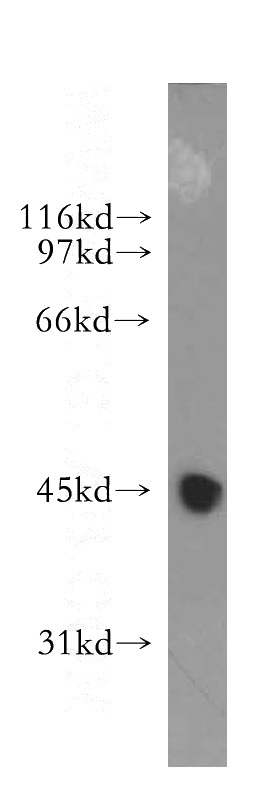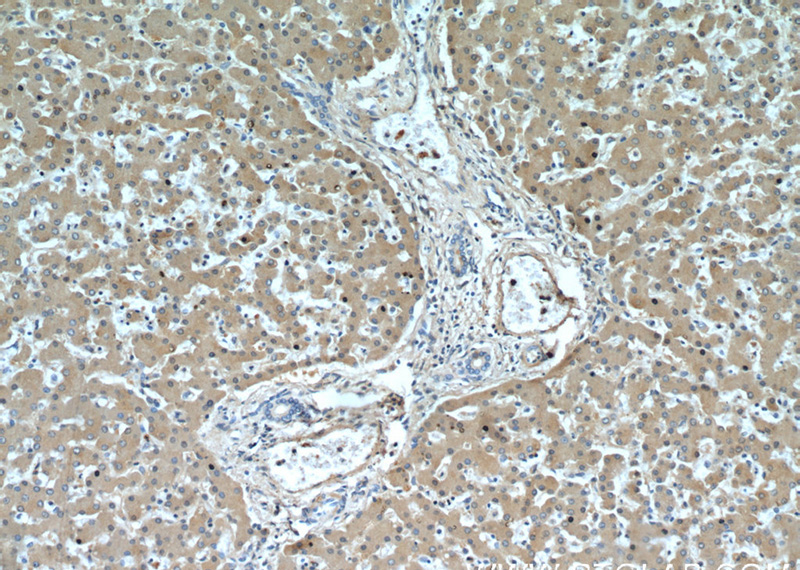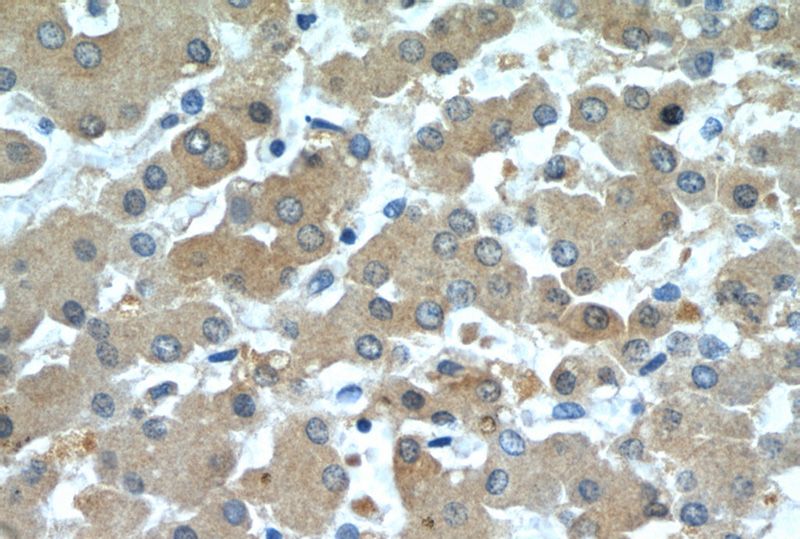-
Product Name
LRG1 antibody
- Documents
-
Description
LRG1 Rabbit Polyclonal antibody. Positive IHC detected in human liver tissue, human pancreas cancer tissue. Positive WB detected in HepG2 cells, HEK-293 cells, HL-60 cells, L02 cells. Observed molecular weight by Western-blot: 45 kDa
-
Tested applications
ELISA, WB, IHC
-
Species reactivity
Human, Mouse; other species not tested.
-
Alternative names
HMFT1766 antibody; LRG antibody; LRG1 antibody
-
Isotype
Rabbit IgG
-
Preparation
This antibody was obtained by immunization of LRG1 recombinant protein (Accession Number: NM_052972). Purification method: Antigen affinity purified.
-
Clonality
Polyclonal
-
Formulation
PBS with 0.02% sodium azide and 50% glycerol pH 7.3.
-
Storage instructions
Store at -20℃. DO NOT ALIQUOT
-
Applications
Recommended Dilution:
WB: 1:500-1:5000
IHC: 1:20-1:200
-
Validations

HepG2 cells were subjected to SDS PAGE followed by western blot with Catalog No:112318(LRG1 antibody) at dilution of 1:400

Immunohistochemistry of paraffin-embedded human liver slide using Catalog No:112318(LRG1 Antibody) at dilution of 1:50

Immunohistochemistry of paraffin-embedded human liver slide using Catalog No:112318(LRG1 Antibody) at dilution of 1:50
-
Background
LRG1, also known as LRG, is a member of the leucine-rich repeat (LRR) family of proteins, containing eight LRR (leucine-rich) repeats and one LRRCT domain. The gene of LRG1 maps to chromosome 19p13.3, and encodes a 347-amino acid protein with a predicted unmodified molecular weight of 38 kD. The mature form of LRG1 is a secreted glycoprotein which has 312 amino acids and an experimentally determined molecular mass of 45 kD. The LRR family of proteins, including LRG1, have been shown to be involved in protein-protein interaction, signal transduction, and cell adhesion and development. LRG1 is expressed during granulocyte differentiation. Levels of the LRG protein are markedly elevated in acute appendicitis and therefore could be used as a diagnostic aid.
-
References
- Sandanayake NS, Sinclair J, Andreola F. A combination of serum leucine-rich α-2-glycoprotein 1, CA19-9 and interleukin-6 differentiate biliary tract cancer from benign biliary strictures. British journal of cancer. 105(9):1370-8. 2011.
- Serada S, Fujimoto M, Terabe F. Serum leucine-rich alpha-2 glycoprotein is a disease activity biomarker in ulcerative colitis. Inflammatory bowel diseases. 18(11):2169-79. 2012.
- Furukawa K, Kawamoto K, Eguchi H. Clinicopathological Significance of Leucine-Rich α2-Glycoprotein-1 in Sera of Patients With Pancreatic Cancer. Pancreas. 44(1):93-98. 2015.
- Zhang Y, Luo Q, Wang N. LRG1 suppresses the migration and invasion of hepatocellular carcinoma cells. Medical oncology (Northwood, London, England). 32(5):146. 2015.
- Takemoto N, Serada S, Fujimoto M. Leucine-rich α-2-glycoprotein promotes TGFβ1-mediated growth suppression in the Lewis lung carcinoma cell lines. Oncotarget. 6(13):11009-22. 2015.
Related Products / Services
Please note: All products are "FOR RESEARCH USE ONLY AND ARE NOT INTENDED FOR DIAGNOSTIC OR THERAPEUTIC USE"
